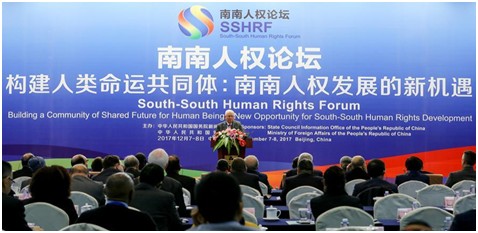首届“南南人权论坛”《北京宣言》
Beijing Declaration
(Adopted by the First South-South Human Rights Forum)
2017年12月8日
December 8, 2017

2017年12月7日至8日,首届“南南人权论坛”在北京举行。中国国家主席习近平致贺信,中共中央政治局委员、中央宣传部部长黄坤明出席论坛开幕式,宣读习近平主席贺信并致辞,外交部部长王毅出席论坛开幕式并致辞。本届论坛由中华人民共和国国务院新闻办公室、中华人民共和国外交部共同举办,来自世界70多个国家和国际组织的300余位代表出席论坛并积极参与讨论,共商发展中国家和世界人权发展大计。
From
December 7 to December 8 of 2017, the first “South-South Human Rights Forum”
was held in Beijing. Chinese President Xi Jinping sent a congratulatory letter.
Mr. Huang Kunming, Member of the Political Bureau and the Secretariat of the
CPC Central Committee, Minister of the Publicity Department of the CPC Central
Committee, attended the opening ceremony of the forum and read President Xi
Jinping’s congratulatory letter and delivered a speech. Foreign Minister Wang
Yi also attended the opening ceremony and delivered a speech. The forum is
jointly sponsored by the Information Office of the State Council of the
People’s Republic of China and the Ministry of Foreign Affairs of the People’s
Republic of China, and is attended by more than 300 representatives from over
70 countries and international organizations in the world. The representatives
actively participated in discussions on the development of human rights in the
developing countries and the world.
与会人士认为,习近平主席致论坛的贺信,奉行人民至上的价值取向和以人民为中心的发展思想,坚持人权的普遍性和特殊性相统一,强调以合作促发展、以发展促人权,呼吁共同构建人类命运共同体,对广大发展中国家乃至世界人权事业发展具有重要引领作用。
The
participants believed that the congratulatory letter addressed to the forum by
President Xi Jinping pursues the value of putting the people first and the
development thought centered on the people, insisting on the unity of
universality and particularity of human rights, emphasizing cooperation for
development, promoting human rights through development, and calling for joint
development of a community of shared future for human beings, which would play
an important leading role in the development of human rights in the developing
countries and the world at large.
与会人士强调,习近平主席提出的构建人类命运共同体重大理念,顺应时代潮流,契合发展要求,体现了全新的人类社会价值追求,为解决包括人权治理在内的全球性问题指明了方向,是中国为推进人类社会发展进步而做出的重大思想贡献。
The
participants stressed that President Xi Jinping’s proposal to build a community
of shared future for human beings is a major concept which conforms to the
trend of the times, fits the requirements of development, and reflects the
pursuit of a new human social value. It has pointed out the direction for
solving global problems, including human rights governance, and is a major
ideological contribution made by China to promote the development and progress
of human society.
与会人士指出,当今世界,发展中国家人口占80%以上,全球人权事业发展离不开广大发展中国家共同努力。多年来,发展中国家人权状况不断得到改善,为推进世界人权事业发展作出了重大贡献。但是,受多种因素的制约和影响,提高发展中国家人权保障水平依然面临诸多问题,需要广大发展中国家和国际社会持之以恒,不懈奋斗。
The
participants pointed out that in today’s world, the population of developing
countries accounts for more than 80 percent of world population, and the
development of the global human rights is inseparable from the joint efforts of
the vast numbers of developing countries. Over the years, the human rights situations
in the developing countries have been continuously improved, which has made a
major contribution to the promotion and development of human rights in the
world. However, due to the constraints and impacts of various factors, there
are still many problems in improving the human rights protection of developing
countries. Therefore, it is necessary for developing countries and the
international community to keep on making their unremitting efforts.
与会人士表示,中国从国情出发推进人权事业发展,以生存权和发展权为首要的基本人权,坚持全面的、发展的人权观,不仅自身人权事业发展取得巨大成就,也为世界人权事业发展作出了重大贡献,提供了中国经验。
It
is noted that China develops human rights based on national conditions, with
the right to subsistence and the right to development as the primary basic
human rights. China adheres to a comprehensive and evolving view of human
rights, making not only great achievements in the development of its own human
rights cause but also significant contributions to the development of human
rights in the world, offering China’s experience.
与会人士围绕“构建人类命运共同体:南南人权发展的新机遇”这一主题进行了深入思考和讨论,并共同宣告如下:
Around
the topic “Building A Community of Shared Future for Human Beings: New
Opportunities for South-South Human Rights Development,” participants had
in-depth reflection and discussions and they jointly declared the following
articles:
第一条Article 1
为确保对人权的普遍认可和遵行,人权的实现必须考虑区域和国家情境,考虑政治、经济、社会、文化、历史和宗教背景。人权事业发展必须也只能按照各国国情和人民需要加以推进。各国应坚持人权的普遍性和特殊性相结合的原则,从国情出发选择适合本国实际的人权发展道路或保障模式。各国和国际社会有责任为实现人权创造必要条件,包括维护和平、安全与稳定,促进经济和社会发展,消除实现人权的各种障碍。
In
order to ensure universal acceptance and observance of human rights, the
realization of human rights must take into account regional and national
contexts, and political, economic, social, cultural, historical and religious
backgrounds. The cause of human rights must and can only be advanced in
accordance with the national conditions and the needs of the peoples. Each
State should adhere to the principle of combining the universality and
specificity of human rights and choose a human rights development path or
guarantee model that suits its specific conditions. States and the
international community have a responsibility to create the necessary
conditions for the realization of human rights, including the maintenance of
peace, security and stability, the promotion of economic and social development
and the removal of obstacles to the realization of human rights.
第二条Article
2
人权是所有文明的内在组成部分,应承认所有文明平等,都应受到尊重。应珍视并尊重不同文化背景的价值和社会道德,相互包容、相互交流、相互借鉴。各国政府和各国人民应本着共商共建共享的原则,同心协力构建人类命运共同体,建设持久和平、普遍安全、共同繁荣、开放包容、清洁美丽的世界,使人类远离恐惧,远离贫困,远离疾病、远离歧视。人类命运共同体汇聚着世界各国人民对和平、发展、繁荣向往的最大公约数。
Human
rights are an integral part of all civilizations, and all civilizations should
be recognized as equal and should be respected. Values and ethics of different
cultural backgrounds should be cherished and respected, and mutual tolerance,
exchange and reference should be honored. All governments and peoples should
work together to build a community of shared future for human beings based on
the principles of mutual benefit and sharing, build a world of lasting peace,
universal security, common prosperity, openness, tolerance and cleanness, so
that humanity is free from fear, from poverty, from disease, from
discrimination and from isolation. The community of shared future for human
beings represents the yearning of peoples of the world for peace, development
and prosperity.
第三条Article
3
生存权和发展权是首要的基本人权。发展权的主体是人民。为实现人类整体利益的最大化,应坚持个人发展权与集体发展权相统一,使各国人民拥有平等的发展机会,充分实现发展权。发展中国家应当特别重视保障人民的生存权和发展权,特别是获得相当的生活水准、足够的食物、衣着、安全饮用水、住房的权利,获得安全、工作、受教育的权利,以及健康权利和社会保障权利等。国际社会应将消除贫困和饥饿等作为首要任务,着力解决发展不平衡不充分不可持续问题,为发展中国家人民发展权的实现创造更多有利条件。
The
right to subsistence and the right to development are the primary basic human
rights. The main body of the right to development is the people. In order to
maximize the overall interests of mankind, it is necessary to uphold the unity
of the right to development at individual level and the right to development at
collective level, so that all peoples have equal opportunities for development
and fully realize the right to development. Developing countries should pay
special attention to safeguarding the people’s right to subsistence and right
to development, especially to achieve a decent standard of living, adequate
food, clothing, and clean drinking water, the right to housing, the right to
security, work, education, and the right to health and social security. The
international community should take the eradication of poverty and hunger as
the primary task, and strive to solve the problem of insufficient and
unsustainable development and create more favorable conditions for the
realization of the people’s right to development especially in the developing
countries.
第四条Article
4
人人生而自由,在尊严和权利上一律平等。人的尊严不仅涉及人的自由,而且关系人的全面发展。人权是个人权利与集体权利的统一。各国人民的生存权、发展权、和平权、环境权等,既是重要的集体人权,又是实现个人人权的前提和基础。所有人权不可分割、相互联系。公民和政治权利的获得离不开同时获得经济、社会和文化权利,两者同等重要,相互依存。
All
human beings are born free and equal in dignity and rights. Human dignity is
not only related to human freedom, but also decisive to the all-round
development of human beings. Human rights are the unity of individual rights
and collective rights. The right to subsistence and the right to development,
the right to peace, and the right to the environment are both important
collective human rights and the prerequisite and basis for the realization of
individual human rights. All human rights are indivisible and interdependent.
The acquisition of civil and political rights is inseparable from the simultaneous
acquisition of economic, social and cultural rights, which are equally
important and interrelated.
第五条Article
5
人权不可剥夺,各国都应为推进人权法治保障而努力。对人权限制必须由法律规定,并只应为了保障其他社会成员的人权和基本自由(其中包括免于宗教亵渎、种族主义和歧视),且满足国家安全、公共秩序、公共健康、公共安全、公共道德和人民普遍福利的正当需要。每个人都对所有其他人和社会负有责任,享有人权和基本自由必须与履行相应责任相平衡。
Human
rights are inalienable, and all countries should make efforts to promote the
legal guarantee of human rights. Restrictions on the exercise of human rights
must be determined by law, and only for the protection of the human rights and
fundamental freedoms of other members of society (including freedom from
religious desecration, racism and discrimination) and meet the legitimate needs
of national security, public order, public health, public safety, public morals
and the general welfare of the people. Everyone is responsible to all others
and to society, and the enjoyment of human rights and fundamental freedoms must
be balanced with the fulfillment of corresponding responsibilities.
第六条Article
6
各国应根据本国法律和所承担的国际义务,注重保障特定群体的人权和基本自由,包括少数族裔、民族、种族,宗教和语言群体,妇女、儿童和老人,以及迁徙工人、残障人士、原住民、难民和流离失所者。各国有义务尊重和保护宗教少数群体,宗教少数群体同样有义务适应本土环境,包括接受和遵守所在地的宪法和法律,融入当地社会。人人有权选择自己的信仰,包括选择信仰宗教和不信仰宗教,选择信仰某种宗教或信仰另一种宗教,不受歧视。
States
should, in accordance with their national laws and international obligations,
focus on guaranteeing the human rights and fundamental freedoms of specific
groups, including ethnic, national, racial, religious and linguistic groups and
migrant workers, people with disabilities, indigenous people, refugees and
displaced persons. States have an obligation to respect and protect religious
minorities, and religious minorities have the same obligation to adapt to their
local environment, and this includes the acceptance and observance of the Constitution and laws of their localities, as well
as their integration into the local society. Everyone has the right to choose
his or her own beliefs, including the choice of believing or not believing a
religion, and the choice of believing one religion or another, without being
discriminated.
第七条Article
7
南南合作是促进发展中国家发展和人权进步的重要途径。南南国家之间应以同舟共济、权责共担、互帮互助、合作共赢的精神,坚持以团结促合作,以合作促发展,以发展促人权,努力实现更加充分的人权保障。国际社会应本着平衡、包容、普惠和可持续的原则,积极支持发展中国家加快发展,不断提高发展中国家人权保障水平。
South-South
cooperation is an important way to promote development and human rights
progress in developing countries. The South-South countries should adhere to
the spirit of solidarity, sharing of responsibilities and obligations, mutual
help and win-win cooperation, and insist on promoting cooperation with unity,
advancing development through cooperation, and promoting human rights through
development, making efforts to achieve more adequate human rights protection.
The international community should, in line with the principles of balance,
inclusiveness and sustainability, actively support better development of developing
countries and constantly improve the protection of human rights in those
countries.
第八条Article
8
国际社会对人权事项的关切,应始终遵行国际法和公认的国际关系基本准则,其中至为关键的是尊重国家主权、领土完整和不干涉各国内政。各国应坚持主权平等的原则,所有国家不论大小,均有权决定其政治制度,控制和自由利用其资源,自主追求其经济、社会和文化发展。人权问题上的政治化、选择性和双重标准,滥用军事、经济或其他手段干涉他国事务,是与人权的目的和精神背道而驰。国际社会保护人权的相关行动必须严格遵守《联合国宪章》的相关规定,并应充分尊重当事国和区域组织的意见。
The
international community’s concern for human rights matters should always follow
the international law and the universally recognized basic norms governing
international relations, of which the key is to respect national sovereignty,
territorial integrity and non-interference in the internal affairs of states.
All countries should adhere to the principle of sovereign equality, and all
countries, big or small, have the right to determine their political systems,
control and freely use their own resources, and independently pursue their own
economic, social and cultural development. The politicization, selectivity and
double standards on the issue of human rights and the abuse of military,
economic or other means to interfere in other countries’ affairs run counter to
the purpose and spirit of human rights. The relevant actions of the
international community to protect human rights must be in strict compliance
with the relevant provisions of the Charter
of the United Nations and
should respect the views of the concerned states and regional organizations.
第九条Article
9
人权的实现永无止境,人权事业的发展永远在路上。人权保障没有最好,只有更好。人民的满意是检验人权及其保障方式合理性的最终标准。各国政府有责任根据人民的要求持续提高人权保障水平。国际社会应在平等和相互尊重基础上通过对话交流、互学互鉴和凝聚共识,促进人权合作。
The
realization of human rights is never-ending and the development of human rights
is always ongoing. In terms of human rights protection, there is no best way,
only the better one. The satisfaction of the people is the ultimate criterion
to test the rationality of human rights and the way to guarantee them. It is
the responsibility of governments to continuously raise the level of human
rights protection in accordance with the demands of their peoples. The
international community should promote human rights cooperation through
dialogue and exchange, mutual learning and mutual understanding and
consensus-building on the basis of equality and mutual respect.















